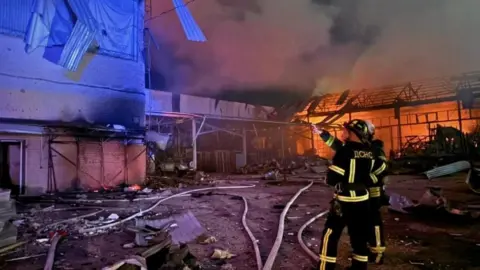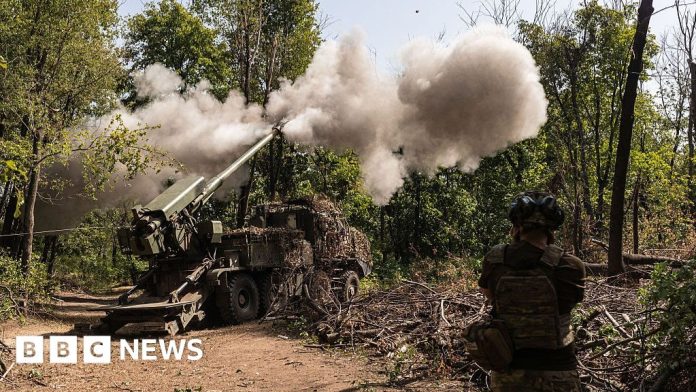Sarah RainsfordSouthern and Eastern Europe Correspondent in Kyiv and
Paulin KolaBBC News in London
The UK and its allies stand ready to support Ukraine before negotiations to end the war as well as to secure an eventual peace deal, the UK defence secretary says.
Ahead of a top-level meeting in Paris on Thursday, John Healey told the BBC in Kyiv that Ukraine’s allies would “help make the skies safe, to make the seas safe, and to secure the land”, once a peace deal had been struck.
About 30 leaders will take part in the Paris summit, in person or online, and French diplomats say “technical work” on providing security guarantees is now complete in the event of a ceasefire.
France’s Emmanuel Macron said the question now was “the sincerity of Russia”.
President Vladimir Putin conveyed a defiant message from China on the eve of the meeting, vowing his full-scale invasion could continue.
The UK defence secretary suggested there was bluster in Putin’s words, insisting that Russia was under pressure.
One of the key requirements envisaged by diplomats is an American “safety net”, and Nato chief Mark Rutte said the aim was to have “clarity” on what the coalition could deliver so they could discuss what the Americans could provide.
A source at the Élysée Palace said they were only waiting for US confirmation that it would act as an ultimate backstop.
US special envoy Steve Witkoff is known to have arrived in Paris ahead of the talks and US President Donald Trump will talk with leaders over the phone afterwards.
One of the big questions is whether any countries will commit to providing troops on the ground if a deal is reached. The US has ruled that out, and Germany has said it is too soon to make that kind of commitment.
John Healey praised US President Donald Trump who he said had “brought Putin into talks” and “not closed off any options”, despite widespread criticism of the warm welcome Trump gave the Russian leader last month in Alaska.
Trump told CBS News on Wednesday that he remained committed to a Russia-Ukraine peace deal: “I think we’re going to get it all straightened out.”
Trump has spoken this week of being “disappointed” in Putin, but he has said that before. He has also threatened to punish the Russian leader for the apparent refusal to end the war – or even meet Ukraine’s President Volodymyr Zelensky for peace talks.
When asked on Wednesday whether the war in Ukraine could end soon, Putin said “there is a certain light at the end of the tunnel”.
“It seems to me that if common sense prevails, it will be possible to agree on an acceptable solution to end this conflict,” he said, before threatening: “If not, then we will have to resolve all our tasks militarily.”
He went on to list Russia’s maximalist demands as usual – including for the authorities in Kyiv to end what he called discrimination against ethnic Russians – one of the allegations mentioned as a pretext for the full-scale invasion of the neighbour he launched in February 2022.
As for meeting Zelensky, Putin seemed to mock the very idea – which Trump had said he was ready for.
“I have never ruled out the possibility of such a meeting. But is there any point? Let’s see,” Putin said in Beijing.
Zelensky could always go to Moscow to see him, he said – a “knowingly unacceptable” idea, Ukraine’s foreign minister was quick to point out.
Last week, President Macron suggested Putin was “playing” Trump.
But John Healey stressed that the US president “has not ruled out any further action, including economic measures, to put more pressure on Putin”.
“We in the Coalition of the Willing, nations like the UK are willing to put extra economic pressure on Putin. We’re willing to give extra aid to Ukraine so they can keep in the fight.
“It’s why we’ve passed today £1bn ($1.24bn) of seized Russian assets, recycled into military aid and kit to Ukraine. If you like, Putin’s dirty money returned with interest.”
The proposed deal includes continuing to train and supply Ukraine’s own army.
It also envisages European troops being deployed to Ukraine – in unspecified numbers – to deter any future Russian aggression – a signal that Ukraine can count on its allies “full solidarity and… commitment”, the Élysée source said.
Such a deployment would need a ceasefire, the responsibility for which “falls to the Americans who are negotiating with the Russians”.
John Healey refused to give details, despite being pressed, “because that will only make Putin wiser.”
For the time being, like Italy and other coalition members have ruled out sending soldiers to Ukraine to police any future peace on the ground.
A German government spokesman told the BBC that the priority for now was getting Russia to agree to a ceasefire – which Putin has consistently rejected.
President Trump pressed Putin for that during their summit in Alaska last month, then emerged to cite Putin’s argument that finding a final deal would be a better way out of the conflict.
 Reuters
ReutersIn the meantime, Russia’s aerial attacks have intensified in both frequency and scale. Overnight into Thursday, Ukraine said it had neutralised 84 drones, but that 17 locations had been hit across the country.
Last week, a Russian missile hit a block of flats in Kyiv killing 22 people, including four children, in one of the deadliest strikes since Russia’s full-scale invasion.
There is now a heap of stuffed toys in the ruins, and photographs.
From shattered stairways, residents emerge with potted plants and bags of clothes covered in dust that somehow survived the strike. A few steps away, others stand and stare at the wreckage.
A teenage girl said she had left the bomb shelter that morning because it filled with smoke after the first missile hit. Then a second landed across the road and her sister was killed.
Ihor Maharynsky only survived because he was out of town that night. His wife, Natalia, was in their fifth-floor flat and didn’t make it to the shelter. He had to identify her body in the mortuary.
“What kind of strategic target is there here?” he demanded, looking around at a car park and a technical college nearby. “There’s nothing.”
Right now, Ihor sees no prospect at all of peace with Russia.
And like many Ukrainians, he is furious at Donald Trump for rolling out the red carpet in Alaska last month for Vladimir Putin.
“Peace talks with Putin? With this ****?” Ihor wanted to know, with a string of expletives. “It is peaceful people who are dying.”


